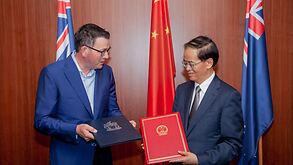In October last year the Andrews Government of Victoria entered into an agreement with the Chinese Government which had the effect of extending Belt and Road (OBOR) projects into Southern Australia.
The Andrews Government kept the agreement secret ,and then under pressure released a MOU it had signed with China, which has since been removed from its websites.
This is an example of the typically childish behaviour of politicians on both sides of politics, who seem completely ignorant of the fact that when they venture outside their own (very small) spheres of influence, they come within regulatory regimes that care little for who they are.
Andrews can expect that his agreement with the Chinese will come under the scrutiny of the US DOJ,regardless of how well he thinks he has covered his tacks in Australia:
China's “Belt and Road” Projects Under Growing FCPA Scrutiny
Enforcement activity related to the United States’ Foreign Corrupt Practices Act (FCPA) has proliferated in the Greater China region in recent years as a part of a focus by prosecutors in the U.S. to prioritize FCPA violations by companies in China.
China’s “Belt and Road Initiative” (BRI) has thus seemed naturally to lend itself to scrutiny. Recent corruption scandals related to investment activity in the BRI have made such activity glaring targets for FCPA enforcement actions.
1MDB liability: the BRI under the microscope
The financial scandal involving Malaysia’s state development fund, 1Malaysia Development Berhad (1MDB), the country’s former prime minister, Najib Razak, and the investment bank Goldman Sachs have captivated corporate audiences around the world.
The U.S. Department of Justice (DOJ) has been pursuing enforcement action against corporations and individuals involved for violations of the FCPA. It is also pursuing criminal charges in instances where 1MDB actors used the U.S. financial system to launder funds or to pay bribes and kickbacks.
Specifically, the DOJ has alleged that 1MDB officials used various means to launder illicit funds, including investment in the production of a film made in the United States, and to purchase interests in U.S. businesses and assets. U.S. financial institutions were also used as vehicles to launder money, giving the DOJ jurisdiction to pursue enforcement action. The scandal, which involves politicians, individual businesspeople, government agencies, and private corporations around the world has attracted intense FCPA scrutiny into transactions that 1MDB or Razak were involved in.
Investments made by the Malaysian fund seem to be fair game, including its recent investments into the BRI. There have been rumors alleging connections between Razak and the BRI, apart from his involvement in 1MDB.
It is highly likely that U.S. regulators will examine businesses involved in the BRI more closely for potential FCPA issues and indicators of financial crime that may have been conducted through the U.S. financial system.
The pervasive reach of the DOJ
The FCPA gives U.S. agencies such as the DOJ and the Securities and Exchange Commission (SEC) broad authority to prosecute offenses through the U.S. court system. U.S. individuals and corporate entities, including companies listed on U.S. stock exchanges, are subject to the FCPA if they use any means of interstate commerce in furtherance of a foreign bribery offense committed anywhere in the world.
The recent conviction of Patrick Ho, Hong Kong’s former home secretary, further illustrates how the DOJ can successfully prosecute non-U.S. individuals and corporations for FCPA violations through their connections to the United States. Last December, Ho was sentenced to three years in prison and ordered to pay a $400,000 fine for bribing government officials in Chad and Uganda in exchange for contracts for a Chinese energy company.
The DOJ said its jurisdiction over the matter rested on the fact that Ho was connected to a non-profit group based in the United States during the period in which the offenses were carried out.
BRI compliance considerations
Highly hyped, the BRI has attracted interest from countries around the world, including some with a reputation for corrupt dealings. Many of the investment projects associated with the BRI have also involved industries which are highly susceptible to bribery, such as the infrastructure sector.
Events surrounding 1MDB have cast an even more intense regulatory spotlight on BRI activity. U.S. regulators in particular are likely to scrutinize business dealings related to the BRI, where those dealings have U.S. connections or use U.S. instruments of commerce. As a result, anti-bribery compliance measures that are aligned with the DOJ’s expectations are a must-have, even for non-U.S. businesses.
The DOJ has issued guidance on corporate compliance programs, including an Evaluation of Corporate Compliance Programs in 2017 and, prior to that, A Resource Guide to the U.S. Foreign Corrupt Practices Act.
Anti-bribery compliance can be difficult to guarantee, especially in industries or regions that are considered highly susceptible to bribery. Evidence that a company has made efforts to develop and implement internal controls that reflect best practices from regulators could, however, lessen the fallout should a business become subject to an enforcement action.
In addition to evidence that firms have tested the effectiveness of policies and procedures, staff training and awareness can be another indicator to regulators of the strength and seriousness of a company’s anti-bribery compliance measures.
Businesses are advised to develop training materials that are both relevant and timely. Such training materials should address general risks as well as industry-related vulnerabilities. Case studies of recent enforcement actions, especially the two discussed above, can also be useful in illustrating the far reach of the FCPA to boards, employees and affiliates.

No comments:
Post a Comment